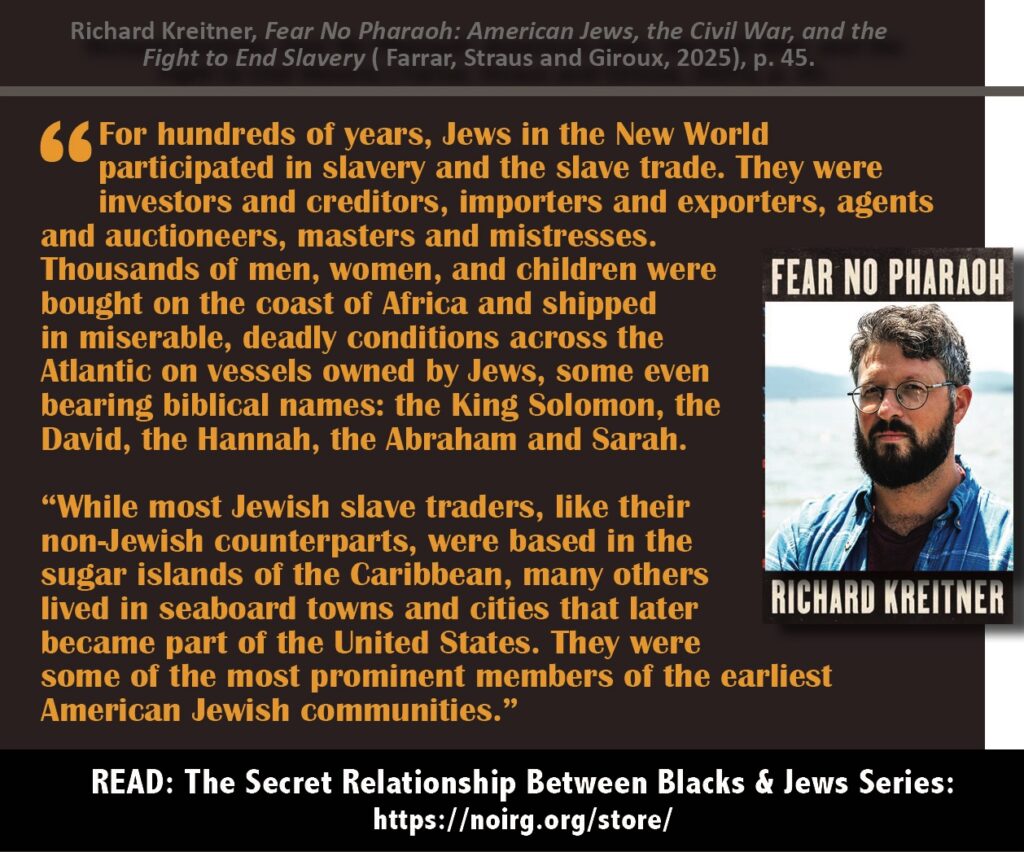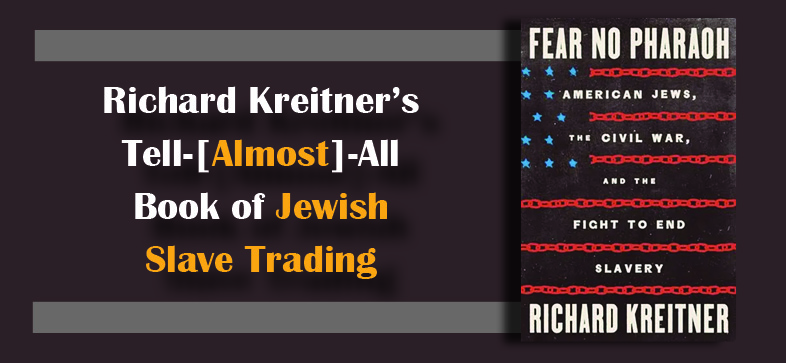Richard Kreitner’s Tell-[Almost]-All Book of Jewish Slave Trading

Richard Kreitner, Fear No Pharaoh: American Jews, the Civil War, and the Fight to End Slavery ( Farrar, Straus and Giroux, 2025).
Richard Kreitner’s Tell-(Almost)-All Book of Jewish Slave-Trading
Fear No Pharaoh (2025), p. 45:
For hundreds of years, Jews in the New World participated in slavery and the slave trade. They were investors and creditors, importers and exporters, agents and auctioneers, masters and mistresses. Thousands of men, women, and children were bought on the coast of Africa and shipped in miserable, deadly conditions across the Atlantic on vessels owned by Jews, some even bearing biblical names: the King Solomon, the David, the Hannah, the Abraham and Sarah.
While most Jewish slave traders, like their non-Jewish counterparts, were based in the sugar islands of the Caribbean, many others lived in seaboard towns and cities that later became part of the United States. They were some of the most prominent members of the earliest American Jewish communities.
Richard Kreitner’s January 30, 2015, Forward article (formerly titled “Should Jews Have To Pay Reparations for Slavery?”) EXCERPT:
Nobody can argue that the balance of the Jewish record on the question of American slavery and the Civil War is anything but regrettable. If the career of Confederate Secretary of War Judah P. Benjamin were not enough, the overwhelming complacency of the antebellum Jewish community, even in the North, provides a record sufficiently embarrassing to warrant official acknowledgement — even, perhaps, reparation.
But there were American Jews before the war who risked everything to fight the South’s “peculiar institution.” Familiar with the story of Exodus, they knew it was not actually all that peculiar….

Jews in the New World participated in slavery at least as fully and profitably as their Gentile neighbors. Jews in New Amsterdam owned slaves within a decade of their 1654 arrival, and their brethren in Newport, Rhode Island, were involved in the slave trade right up until the War of Independence, in which several slaves of the city’s Jews were forced to fight. In the South, being rich enough to own slaves and not owning any “carried it with it social and business disadvantages,” the historian Max Kohler wrote in 1897, while in the North outright abolitionism was discouraged by “business and trade policy,” which “rendered such avowals inexpedient.”
Richard Kreitner, quoted in the March 27, 2025, Forward article titled “Why Jews were like everyone else — only more so — during slavery and the Civil War”:
Legally under the 1790 Naturalization Act, which specified who and how immigrants could become citizens, Jews were absolutely accepted as white. In the South, they were more than accepted as white. They were eagerly welcomed as white because the white population in the South needed all the help they could get to offset very large populations of enslaved African Americans. There’s certainly lots of prejudice, but they did immediately count as white, and I believe that was mostly the case in the North as well, before the Civil War. However, it was a tenuous whiteness….
One is, to the extent that we Jews who are white do enjoy racial privilege in this country — which, though we are targeted and at the receiving end of prejudice, certainly increasingly, we have enjoyed certainly since the 1950s — you can’t have any discussion about race in this country that does not begin with slavery. Slavery and the forms of racial domination, Jim Crow, segregation, has shaped this country and the distribution of wealth and power in this country. We are partakers in that legacy….
But there’s another part of it: I’m sure you’ve seen this episode of Larry David on Finding Your Roots. I’m sure he was strolling around assuming that he was simply a post-1900 [arrival] and he finds out that he has a great-grandfather owned slaves in Mobile, Alabama and fought for the Confederacy. I’ve heard from other people who have uncovered similar stories in their family that they really knew nothing about. They’re actually quite psychologically impacted by this question of, “How can it be that we are not immune to this historical crime?” I think we have ties to it that are both direct and indirect.
Page 116:
Like the Lehman [Brothers], many Jews found the antebellum South a comfortable and congenial home. Jews in the region achieved success as mayors, congressmen, state representatives, editors, bank presidents, railroad directors, and prominent businessmen. Christians in the South donated to Jewish community funds for building and maintaining synagogues or assisting persecuted Jews overseas. Southern governors attended fancy balls to benefit Hebrew schools. Southern Jews did not have to hide their Jewishness. But a tacit agreement lay behind their tenuous welcome. As one resident of Richmond, Virginia, observed, the city’s Jews had learned they could prosper only by remaining “as quiet and unostentatious as possible.” Above all, they had to keep quiet about slavery.
Pages 117-119:
[A] few Southern Jews managed to succeed in the slave economy. In Richmond, the Davis family established what one historian has called “something of a Jewish / slave-trading dynasty.” Two blocks from the state capitol designed by Thomas Jefferson, brothers Hector, Benjamin, John, Robert, and Solomon owned a two-floor slave auction house as well as what they deemed a “safe and commodious jail,” where men, women, and children were held pending sale. In her Key to Uncle Tom’s Cabin, a non-fiction compendium detailing the sources she drew on in writing the 1852 bestseller, Harriet Beecher Stowe quoted a letter about the Davis firm:
“They are Jews, came to that place many years ago as poor peddlers….These men are always in the market, giving the highest price for slaves. During the summer and fall they buy the up at low prices, trim, shave, wash them, fatten them so that they may look sleek, and sell them to great profit.”
In one week in 185 the Davis brothers of Richmond made the equivalent today of more than four million dollars in profit. They sold anywhere from seven to one hundred individuals on an average day….
Jewish slave ownership in the 1850s went far beyond traders and plantation owners. Jewish butchers owned slaves. Jewish lawyers owned slaves. Bookkeepers and brokers and hoteliers owned slaves. A Jewish dentist in Charleston owned twelve people. So masters held one or two workers to help out with the business; others invested in the ownership of people to make some extra money by renting them out to others. Both the native-born and new rivals owned slaves; by one calculation, the former tended to own twice as many as the latter, an average of ten compared to five. In the antebellum South, slave ownership was the ultimate mark of success. A credit report from Georgia in 1860 showed that a German Jewish immigrant named Alexander Baum, a sack-burdened traveling salesman only eight years earlier, was now “going on big scale, buying negroes and land.”
Most of the Jewish immigrants who settled in the South would have known of the existence of slavery in the region before their arrival and would likely have moved to the North if they had a problem with it. Arriving in America in 1847, Aaron Hirsch traveled through Mississippi and Alabama as a peddler. Slavery was “not so great a wrong as people believe,” Hirsch reflected. “The Negroes were brought here in a savage state; they captured and ate each other in their African home. Here they were instructed to work, were civilized and got religion, and were perfectly happy.” Julius Weis, who arrived at the age of nineteen, was startled when he first saw a slave stripped and whipped by an overseer. But before long, Weis bought a slave for himself—a “negro man, a fine looking mulatto.” A successful cotton and dry-goods merchant in New Orleans, Weis claimed he “always felt a pity for the poor slaves” and never punished his human property as he had seen done in the street that day. But he never denounced bondage.
In Charleston, South Carolina, one of the richest men in the city, Benjamin Mordecai, kept his own slave pen next to his warehouse and once purchased $12,000 worth of human beings in a single sale; in 1840 he put forty people, including three children, up for sale at one time. A few blocks away, Grace Peixotto, the Caribbean-born daughter of a former cantor at Congregation Beth Elohim, ran Charleston’s notorious three-story “Big Brick” brothel [and] she personally owned seven women between the ages of six and forty-five. Religious leaders were supportive of the institution.

